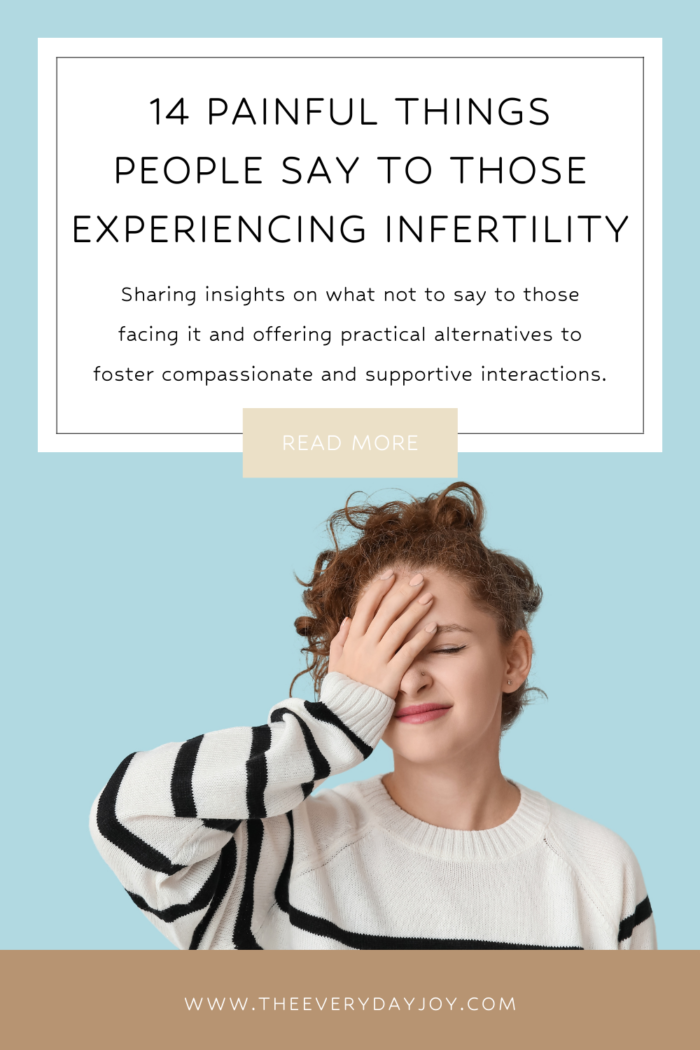14 Painful Things People Say to Those Experiencing Infertility

Let’s dive into a topic that’s been on my mind a lot lately—infertility. It’s been a part of my life for the past 4 1/2 years, and let me tell you, it’s been quite the journey. Along the way, I’ve come across some comments that, well, missed the mark. I’m not here to dwell on the negative. Instead, I want to shed some light on what not to say to someone dealing with infertility. Because even though our loved ones mean well, sometimes they could use a little guidance in the empathy department.
I’ll start by sharing some personal stories that I hope will give you insight into what it’s like to walk in these shoes. Then, we’ll tackle some common phrases that seem harmless but can sting pretty hard. But don’t worry, I’ve got some alternatives that are way more helpful and way less cringe-worthy.
For those who haven’t experienced infertility themselves, it’s easy to accidentally say something that hurts more than it helps. That’s why I’m writing this—to educate and inform, in the hopes that by sharing my experiences, others might avoid making similar mistakes. Feel free to share this with your friends and family; let me be the one to broach this sensitive topic.
Ready to jump in? Let’s get started.
What Is Infertility?
Infertility is more than just a medical term; it’s a complex issue that affects many aspects of life. Recognized as a medical condition by the World Health Organization, infertility occurs when a couple struggles to achieve a clinical pregnancy after a year of regular, unprotected intercourse. For women over 35, this timeline is reduced to six months. Shockingly, this condition affects approximately one in eight couples, highlighting its widespread impact. However, infertility isn’t solely about the physical challenges; it’s also emotionally taxing. Many individuals experiencing infertility often feel isolated, especially when surrounded by seemingly effortless pregnancies. Moreover, the financial burden of seeking treatment adds another layer of complexity to an already challenging journey.
Let me give you a glimpse into some moments that stung a little too much:
“I know how you feel.” During a small group discussion about our infertility journey, I poured my heart out. We were three years deep into this emotional rollercoaster. Right after I shared, someone with a child chimed in, claiming they understood. They then recounted how they struggled for just three months before getting pregnant again. It stung—it felt like our years of heartache were minimized in an instant. Just because someone hasn’t walked our path doesn’t mean they grasp the depth of our journey.
“Are you sure you want to have kids?” A friend, aware of our adoption plans but unaware of our infertility battle’s extent, jokingly questioned our desire to have kids. It hit hard, especially coming from someone in a different life stage. This comment, about 2 1/2 years into our journey, felt like a dagger. We’ve spent years preparing and longing for parenthood, far more than those who conceive easily. It felt like our readiness and commitment were being dismissed in a casual jest, brushing off the depth of our longing.
“Are you even trying to get pregnant?” Four years into our journey, a close friend innocently asked if we were even trying to conceive right after announcing her second pregnancy. It cut deep, especially from someone who should have known our story. As someone intimately familiar with our struggles, this question felt like a painful reminder of our infertility journey’s invisibility. While well-intentioned, such comments can be devastatingly insensitive, adding salt to an already open wound.
Things You Should Not Say to Someone Experiencing Infertility
“Just relax.”
- Why it’s hurtful: This comment implies that stress is the cause of infertility, which oversimplifies a complex medical issue. It can also make the person feel blamed for their condition.
- What to say instead: “This sucks. I’ll have dinner (or groceries) delivered sometime this week for you.”
“Go on vacation.”
- Why it’s hurtful: Vacation doesn’t solve medical infertility issues and can add stress by putting pressure on a couple to conceive during a trip.
- What to say instead: “I know this is rough. I know this hurts, and I’m with you.”
“Just stop trying. It will happen when you least expect it.”
- Why it’s hurtful: Suggesting someone stop trying can invalidate their efforts and imply they’re causing their infertility by caring too much.
- What to say instead: “The waiting and wondering is so hard! I know how much you want this. I’m here for you.”
“Just adopt”
- Why it’s hurtful: Adoption is not a cure for infertility and is not a simple process. It also doesn’t address the grief and pain of infertility.
- What to say instead: “Whatever path you decide to take, you know what is best for your family. You have my full support.”

“I know so many people that get pregnant after they adopt.”
- Why it’s hurtful: This implies that adopting a child will somehow fix infertility, which is not true and minimizes the complex emotions involved.
- What to say instead: “I am so excited for you! How can I support you during and after your adoption?”
“Do IVF“
- Why it’s hurtful: IVF is expensive, time-consuming, and doesn’t work for everyone. It also doesn’t address the underlying causes of infertility.
- What to say instead: “I can only imagine how uncertain everything feels right now. I’m here if you need anything.”
“Have you tried XYZ treatment?”
- Why it’s hurtful: Offering unsolicited advice on treatments can be overwhelming and dismissive of what the person has already tried.
- What to say instead: “Do you have all the resources you’d like? Do you need any help finding resources?”
“I know how you feel.”
- Why it’s hurtful: Unless you’ve experienced infertility, you likely don’t fully understand the pain and challenges it brings.
- What to say instead: “I’m sorry this is happening. I’m here for you.”
“Everything happens for a reason.”
- Why it’s hurtful: This minimizes the person’s pain and can reinforce fears that they’re not meant to have a baby.
- What to say instead: “Wow, that sounds exhausting. How are you coping with all of this?”
“Are you sure you are ready to have kids?”
- Why it’s hurtful: This can be a stab in the heart, questioning the readiness of someone who has been trying and preparing for years.
- What to say instead: “It must be so hard to still not have a baby in your arms. I am really hoping that this works out for you.”
“It could always be worse.”
- Why it’s hurtful: Comparing pain to something worse doesn’t make the current pain any less valid or difficult.
- What to say instead: “I am sorry to hear that this has been such a struggle for you.”
Complaining to me about your own pregnancy.
- Why it’s hurtful: Complaining about pregnancy to someone who is struggling to conceive is insensitive and can be very painful.
- What to say instead: “I wanted to let you know that I’m pregnant. I know your journey has been hard and my heart hurts for what you have been going through.”
“Have you tried getting pregnant?”
- Why it’s hurtful: This question is dismissive and trivializes the efforts and struggles of someone dealing with infertility.
- What to say instead: “Tell me about your journey. How long have you been going through infertility?”
“You can take mine.”
- Why it’s hurtful: This joke can be hurtful as it trivializes the deep desire of someone struggling with infertility to have their own children.
- What to say instead: “What can I do to support you right now?”
What to Do in These Uncomfortable Situations

When faced with insensitive comments, it’s often hard to know how to respond in the moment. Here are some strategies:
Be polite:
Respond with dignity to shut down the conversation politely. Example: “That is a really personal question, and I’m not ready to talk about it yet.”
Educate:
Provide a kind but informative response. Example: “That comment feels invalidating because it minimizes what I’m going through right now.”
Zing:
Use a witty retort for particularly rude comments. Example: “No, I’m not pregnant, I’m just fat.”
Tips for Coping
Dealing with insensitive comments about infertility can be emotionally challenging. Here are some coping strategies to help you navigate these situations:
- Focus on self-care: Taking care of yourself is crucial during difficult times. Whether it’s taking a long bath, going for a walk, or indulging in a hobby, prioritizing self-care can provide much-needed relief from stress and anxiety.
- Seek healthy social support: Surround yourself with understanding and empathetic individuals who can offer support and comfort. Sharing your experiences with others who have gone through similar challenges can help you feel less alone and more understood.
- Be straightforward: It’s okay to set boundaries and assertively communicate your needs. If you’re not comfortable discussing your infertility journey, politely decline or redirect the conversation to a topic you’re more comfortable with.
- Change the subject: You’re not obligated to engage in conversations that make you uncomfortable. If someone brings up a sensitive topic, feel free to gracefully shift the conversation to a different subject.
- Respond with silence: Sometimes, silence can be a powerful response. You don’t owe anyone an explanation or justification for your feelings. If you’re at a loss for words, it’s okay to remain silent and disengage from the conversation.
- Let your partner handle it: Discuss with your partner which comments are off-limits, and let them address certain remarks on your behalf. Having a united front can help protect your emotional well-being while navigating challenging social situations.
- Walk away: If a conversation becomes too overwhelming or uncomfortable, give yourself permission to excuse yourself from the situation. Your mental and emotional health should always take priority.
- Respond with humor: Using humor can be a lighthearted way to diffuse tension in awkward situations. A well-timed joke or witty remark can help lighten the mood and make the conversation more manageable.
- Be firm: If someone crosses a boundary or asks an inappropriate question, don’t hesitate to express your discomfort assertively. Setting clear boundaries shows others that certain topics are off-limits and deserving of respect.
- Let it go: Sometimes, it’s best to simply let go of hurtful comments and move on. Dwelling on negative interactions can take a toll on your mental health, so practice letting go of things that are beyond your control.
Conclusion
As we come to an end, let’s remember that navigating conversations about infertility can be tricky for both sides. While some comments may miss the mark, it’s essential to recognize that most people mean well and may lack understanding. It’s okay to show grace in these moments, but it’s equally important to set boundaries to protect your emotional well-being.
By sharing our experiences and educating others, we can cultivate a more empathetic and supportive community for those facing infertility. Remember, your voice matters, so feel free to share this post with others and join the conversation in the comments below. Together, let’s continue fostering understanding and compassion in the face of infertility challenges.

- Reflect on a time when someone’s well-intentioned comment about your infertility journey missed the mark. How did it make you feel, and how did you respond in that moment?
- Imagine yourself in a situation where someone unknowingly says something hurtful regarding your infertility. How would you respond differently now, armed with the knowledge and advice provided in the blog post?
- Reflect on the “Things You Should Not Say to Someone Experiencing Infertility” listed in the post. Have you encountered any of these statements before? How would you educate others about why these comments are hurtful?
- Think about the strategies suggested for coping with insensitive comments. Which ones resonate with you the most, and why? How do you plan to implement these coping mechanisms in your daily life?




